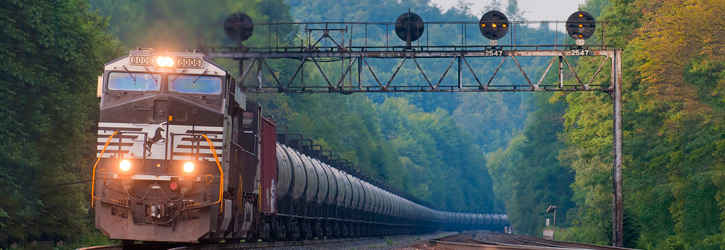
Crude-By-Rail
The rapid growth in shipping crude-oil-by-rail has presented the industry with significant business opportunities and new challenges in railroad safety. RLBA assists clients with assessing opportunities in the market, analyzing financial and operating plans and ensuring safety-focused operating procedures.
Select Project Descriptions:
CONFIDENTIAL CLIENT:
A confidential, Fortune 50 company engaged RLBA to assist in developing an internal policy associated with the transport of crude-by-rail. RLBA participated on conference calls with employees, followed by a review of internal processes used to vet possible rail industry partners as they enter into the crude-by-rail market. RLBA delivered knowledge and expertise to the client about crude-by-rail shipments that led to a solidification of internal policies governing ways in which the company selected business partners in that sector.
CONFIDENTIAL CLIENT:
On behalf of a confidential client which owns extensive downtown commercial properties adjacent to busy rail corridors operated by two railroads, RLBA assessed the amount and types of crude-by-rail and hazardous materials handled on the rail line so that the client could assess the resulting risks. RLBA assessed and briefed the client on relevant rail operations and infrastructure issues. RLBA also examined operations and configuration of the city’s rail network looking for specific hazards. A potential re-route which could be used by the crude-by-rail and hazardous material trains was identified, and order of magnitude costs of the necessary configuration modifications were estimated.
SIERRA CLUB:
The Sierra Club contracted RLBA to evaluate and provide analysis on the U.S. Department of Transportation’s (DOT) proposed rule addressing crude and ethanol rail tank car safety. RLBA prepared a report addressing the ability of the proposed tank car safety measures to adequately mitigate safety risks, while identifying specific measures that would improve tank car standards to reduce the risk of accidents.
SIERRA CLUB:
The Sierra Club Environmental Law Program, in association with the National Resources Defense Council, engaged RLBA to comment on the Keystone XL Pipeline Environmental Impact Statement (EIS) regarding the feasibility of moving large quantities of Alberta Tar Sands Crude from Canada to U.S. refineries by rail. RLBA reviewed the U.S. State Department’s rail analysis, as well as existing SC work products, and determined any deficiencies as to the viability of the current rail system and tank car fleet contained in the State Department’s analysis to handle projected flows of crude by rail.
